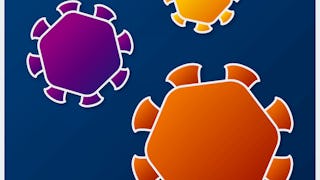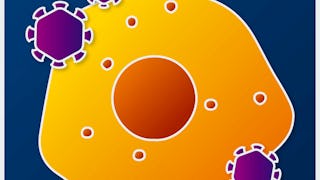- Browse
- Marine Biology
Results for "marine biology"
 Status: Free TrialFree TrialI
Status: Free TrialFree TrialIImperial College London
Skills you'll gain: Immunology, Infectious Diseases, Physiology, Microbiology, Molecular, Cellular, and Microbiology, Public Health and Disease Prevention, Environment, Biology, Research
4.8·Rating, 4.8 out of 5 stars148 reviewsIntermediate · Course · 1 - 3 Months
 Status: Free TrialFree TrialI
Status: Free TrialFree TrialIImperial College London
Skills you'll gain: Molecular Biology, Microbiology, Infectious Diseases, Biotechnology, Medical Science and Research, Immunology, Cell Biology, Epidemiology, Laboratory Research, Biology
4.8·Rating, 4.8 out of 5 stars15 reviewsIntermediate · Course · 1 - 3 Months
 Status: PreviewPreviewU
Status: PreviewPreviewUUniversidad Nacional Autónoma de México
Skills you'll gain: Scientific Methods, Creative Thinking, Research, Critical Thinking, Social Sciences, Ancient History, Decision Making, Analysis, Cultural Diversity, World History, Biology, Physics
4.8·Rating, 4.8 out of 5 stars2.1K reviewsMixed · Course · 1 - 3 Months
 Status: Free TrialFree TrialU
Status: Free TrialFree TrialUUniversity of Florida
Skills you'll gain: Land Management, Environment and Resource Management, Climate Change Mitigation, Climate Change Adaptation, Natural Resource Management, Water Resource Management, Environmental Science, Sustainable Development, Spatial Analysis, Research Methodologies, Biology
4.5·Rating, 4.5 out of 5 stars19 reviewsIntermediate · Course · 1 - 4 Weeks
 Status: Free TrialFree TrialI
Status: Free TrialFree TrialIImperial College London
Skills you'll gain: Infectious Diseases, Epidemiology, Immunology, Microbiology, Public Health, Biology, Molecular Biology, Pharmacology
5·Rating, 5 out of 5 stars19 reviewsIntermediate · Course · 1 - 3 Months
 Status: Free TrialFree TrialU
Status: Free TrialFree TrialUUniversity of California San Diego
Skills you'll gain: Bioinformatics, Molecular Biology, Computational Thinking, Computer Programming Tools, Graph Theory, Python Programming, Biology
4.7·Rating, 4.7 out of 5 stars138 reviewsIntermediate · Course · 1 - 3 Months
 Status: PreviewPreviewU
Status: PreviewPreviewUUniversidade Estadual de Campinas
Skills you'll gain: Patient Evaluation, Product Testing, Personal Care, Laboratory Research, Biology, Pharmacology, Chemistry, Health Care Procedure and Regulation, Physiology, Safety Standards, Biochemistry, Clinical Assessment
4.8·Rating, 4.8 out of 5 stars236 reviewsBeginner · Course · 1 - 3 Months
 Status: PreviewPreviewA
Status: PreviewPreviewAAmerican Museum of Natural History
Skills you'll gain: Healthcare Ethics, Medical Science and Research, Education and Training, Teaching, Interactive Learning, Ethical Standards And Conduct, Biotechnology, Intellectual Property, Medical Privacy, Biology, Food and Beverage
4.6·Rating, 4.6 out of 5 stars174 reviewsMixed · Course · 1 - 4 Weeks
 Status: PreviewPreviewT
Status: PreviewPreviewTThe University of Edinburgh
Skills you'll gain: Discussion Facilitation, Culture, Research, Diversity Awareness, Science and Research, Systems Thinking, Anthropology, Biology, Physical Science, Ethical Standards And Conduct
4.7·Rating, 4.7 out of 5 stars205 reviewsBeginner · Course · 1 - 3 Months
 Y
YYale University
Skills you'll gain: Liberal Arts, Environment, Culture, Biology, Creativity, Systems Thinking, Physical Science, Timelines, Physics, Scientific Methods
4.7·Rating, 4.7 out of 5 stars438 reviewsMixed · Course · 1 - 3 Months
 Status: PreviewPreviewT
Status: PreviewPreviewTTechnion - Israel Institute of Technology
Skills you'll gain: Pain Management, Psychiatry, Patient Safety, Physiology, Substance Abuse, Pharmacology, Neurology, Healthcare Ethics, Drug Interaction, Clinical Trials, Ancient History, Oncology, Mental Health Diseases and Disorders, Biology, World History, Chemistry
4.3·Rating, 4.3 out of 5 stars149 reviewsBeginner · Course · 1 - 3 Months
 Status: Free TrialFree TrialU
Status: Free TrialFree TrialUUniversidad de Palermo
Skills you'll gain: Student-Centred Learning, Psychology, Human Learning, Learning Theory, Creativity, Human Development, Behavior Management, Neurology, Formal Learning, Self-Awareness, Applied Behavior Analysis, Education and Training, Student Engagement, Culture, Molecular Biology, Language Disorders, Anatomy, Cognitive Behavioral Therapy, Computational Thinking, Systems Thinking
4.8·Rating, 4.8 out of 5 stars1.3K reviewsBeginner · Specialization · 3 - 6 Months
In summary, here are 10 of our most popular marine biology courses
- Immunology: Innate Immune System: Imperial College London
- What Are Viruses And How Do We Work With Them?: Imperial College London
- Pensamiento científico: Universidad Nacional Autónoma de México
- Agroforestry IV: Climate, Carbon Storage and Agroforestry: University of Florida
- What Do Viruses Do And How Do We Control Them: Imperial College London
- Comparing Genes, Proteins, and Genomes (Bioinformatics III): University of California San Diego
- Cosmetologia em prol do envelhecimento com saúde e beleza: Universidade Estadual de Campinas
- Genetics and Society: A Course for Educators: American Museum of Natural History
- Philosophy, Science and Religion: Religion and Science: The University of Edinburgh
- Journey of the Universe: The Unfolding of Life: Yale University










